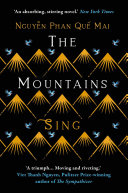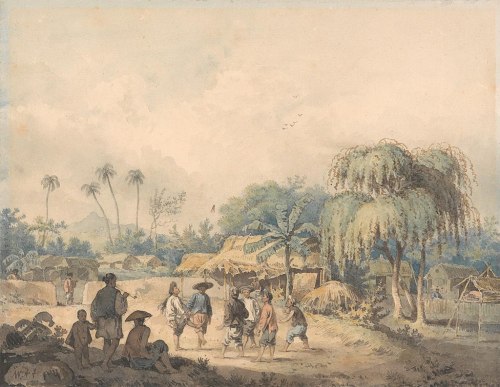 I owe my discovery of this illuminating historical novel from Vietnam to Chris Gordon, community engagement and program manager at Readings Bookstore. She was a real stalwart during the pandemic, enriching the long days of lockdown with author events, and in October 2020 I blogged about Nguyen Phan Que Mai in conversation with Canadian author Natalie Jenner here. Que Mai was in Indonesia at the time, separated from her children in Europe and her parents in Vietnam, and it was a tough time to be launching a debut novel. But the event made her book sound irresistible and I ordered a copy straight away.
I owe my discovery of this illuminating historical novel from Vietnam to Chris Gordon, community engagement and program manager at Readings Bookstore. She was a real stalwart during the pandemic, enriching the long days of lockdown with author events, and in October 2020 I blogged about Nguyen Phan Que Mai in conversation with Canadian author Natalie Jenner here. Que Mai was in Indonesia at the time, separated from her children in Europe and her parents in Vietnam, and it was a tough time to be launching a debut novel. But the event made her book sound irresistible and I ordered a copy straight away.
A family saga of the generations that lived through the tumultuous 20th century in Vietnam, The Mountains Sing tells a story that would be true for many families in Vietnam. Moving backwards and forwards in time, the fractured chronology ranges from French colonialism at the turn of the century, through the rise of the Communist government in the north, to the advent of the civil war that we call the Vietnam War and they call the American War, and finally the reunification of the country under Communism after the US defeat in 1975.
The Tran family were landholders in the north when the Communists took power and engineered ‘Land Reform’ in a program whose excesses are reminiscent of those in China under Mao. Resentful villagers turned on landholders with violence in order to meet quotas set by the government and Dieu Lan, born in 1920, has to flee with her six children and nothing but the clothes on her back.
These six children are the generation that fought in the Indochina War against the French who refused to give up their colonial possession in the postwar era, and then in the civil war, north against south. (With the US interfering in both conflicts as part of the Cold War strategy.) But the story is not told from any military perspective… it is a story of women who use courage and ingenuity to survive.
In the second half of the 20th century Dieu Lan’s granddaughter Huong comes of age as the war is ending and the quest to find missing family members comes to its often shattering conclusion.
It is rare to come across novels written by authors who actually live in Vietnam, and the authenticity of The Mountains Sing is apparent in Que Mai’s use of the language and traditions of Vietnam. But unlike another recent novel that I abandoned because I could not make sense of the frequent use of a language I didn’t know, Que Mai’s skilful bilingualism makes it easy to understand. This is an example selected at random…
A Chinese featherball (Wikipedia)
‘So skillful!’ A child’s voice flowed toward me, together with the rhythmic tick-tick sound of a featherball being kicked. Ngoc, Minh, and Dat were counting, together: ‘Một trăm bảy mươi mốt’ One-hundred and seventy-one times! Could someone kick the ball so many times without dropping it? I stood up, bowed to the altar, and went out to the front yard. I saw the children standing in a circle.
Dressed in shorts, Minh was bare-chested, sweat glistening on his skin. He was balancing on one leg, his other leg kicking a featherball. My brother Cong had found the best feathers and pinned them to a rubber base, to make the ball. (p.94)
While I was looking for an image of a featherball at Wikipedia, I found this lovely 18th century painting of Vietnamese men playing featherball, and just had to share it. It’s by an English painter called William Alexander, who went to China with a British embassy and recorded his impressions in watercolours when he also visited southern Vietnam, then called Cochin China by Europeans.

Vietnamese da cau players, painting by William Alexander, c. 1792.
Que Mai also uses the wisdom of generations of Vietnamese women with many proverbs and idioms, but always in a bilingual context.
Guava, at a young age, was already bé hạt tiêu — a little hot pepper. (p.94)
‘Given what happened to his father, I’ve warned him about the dangers of politics. Yet he doesn’t want to listen. People say ‘mưa dầm thấm lâu.’ Soft and persistent rain penetrates the earth better than a storm. I need to be patient with him.’ (p.107)
 The Mountains Sing is a rewarding book, revealing about aspects of Vietnamese history that most of us don’t know, from a female perspective focussed firmly on the family and how its women cope with the years of conflict. I have a copy of Que Mai ‘s Dust Child (2023) too, about the children of American servicemen searching for their parents, and am looking forward to reading it.
The Mountains Sing is a rewarding book, revealing about aspects of Vietnamese history that most of us don’t know, from a female perspective focussed firmly on the family and how its women cope with the years of conflict. I have a copy of Que Mai ‘s Dust Child (2023) too, about the children of American servicemen searching for their parents, and am looking forward to reading it.
The Mountains Sing was an international bestseller so it’s probably widely available.
Author: Nguyễn Phan Quế Mai
Title: The Mountains Sing
Publisher: One World, 2020
ISBN: 9781786079503, pbk., 342 pages
Source: Personal library, purchased from Readings $29.99
Other reviews
Image credits
- Vietnamese da cau players, painting by William Alexander, c. 1792, by William Alexander – Yale Center for British Art, CC0, https://commons.wikimedia.org/w/index.php?curid=113203549
- Shuttlecock By Yoshi24517 – Own work, CC BY-SA 3.0, https://en.wikipedia.org/w/index.php?curid=45559426
Please note: I have used Vietnamese naming conventions (family name first) and the diacritics for the title of this post but for tags, categories and the text of this review I have mostly removed the diacritics because WordPress software doesn’t recognise them and they mess up the alphabetical order in categories.



I am very tempted!
LikeLike
By: Jennifer on January 23, 2024
at 10:17 am
Do check out those other reviews, especially the Saigoneer… it makes the point that most books are orientated towards the US and their presence in Vietnam, but this one isn’t.
LikeLiked by 1 person
By: Lisa Hill on January 23, 2024
at 10:25 am
And now I have bought a copy ;-)
LikeLike
By: Jennifer on January 23, 2024
at 10:38 am
Mission accomplished!
LikeLiked by 1 person
By: Lisa Hill on January 23, 2024
at 12:25 pm
This sounds so ambitious and accomplished – and I checked, I can get it here, hooray!
LikeLike
By: madamebibilophile on January 24, 2024
at 1:58 am
That’s great, I hope you enjoy it:)
LikeLiked by 1 person
By: Lisa Hill on January 24, 2024
at 8:38 am
Sounds fabulous, Lisa – I think it must be very unusual for a book from the Vietnamese viewpoint to make it into translation. Thanks for the heads-up!
LikeLike
By: kaggsysbookishramblings on January 24, 2024
at 2:53 am
Ah, but it’s not in translation! She wrote it in English.
In fact she came here to Australia on a scholarship, I think, so was here for a few years at university.
LikeLike
By: Lisa Hill on January 24, 2024
at 8:37 am
Oh that’s even more interesting! Great find!!
LikeLike
By: kaggsysbookishramblings on January 24, 2024
at 8:45 pm
Yes!
LikeLiked by 1 person
By: Lisa Hill on January 24, 2024
at 8:57 pm
I’ve been eyeing this off (and The Dust Child) for a few years now too. You’ve made it sound very tempting Lisa.
LikeLike
By: This Reading Life on January 24, 2024
at 9:03 am
I’ve read a little bit of fiction written by people of Vietnamese heritage who fled the Communists and came to Australia, but I hadn’t read anything that features people who stayed there through it all. So it is very interesting…
LikeLiked by 1 person
By: Lisa Hill on January 24, 2024
at 9:35 am
You’re right, I’ve only read, I think, works by Vietnamese who have moved to America or whose parents moved to Australia. I’ve not come across much by Vietnamese writers. This sounds well worthwhile.
LikeLike
By: whisperinggums on January 25, 2024
at 3:48 pm
It’s so often the case with authors from other countries as well. Often they have had an academic education in the US or UK (sometimes on a scholarship and sometimes because they are privileged financially). If they haven’t lived in their home country for years, it does, IMO, colour their perspective on their home country.
The situation is analogous to the situation here in Australia before we had our own publishing industry: UK publishers would only publish our authors if the work would sell in both markets, and that influenced the kind of books that made it to market.
I would really like to see global publishing infrastructure be developed in those countries that don’t already have it, so that they are picking up and publishing authors in their home countries.
LikeLiked by 1 person
By: Lisa Hill on January 25, 2024
at 4:13 pm
Yes I agree … I would only add that sometimes being away can give a perspective that you don’t have when you are immersed. But of course I agree that we want good publishing industries within countries themselves.
LikeLike
By: whisperinggums on January 25, 2024
at 4:59 pm
An example I’m thinking of is Merlinda Bobis’ Fish-hair woman. It feels authentic though she’d been living in Australia for a while by the time she wrote it.
LikeLike
By: whisperinggums on January 25, 2024
at 5:02 pm
OTOH There’s Teju Cole who is so very judgemental about his home country. Ok, it seems true that there’s a lot to be concerned about in Nigeria, but I’ve read Nigerian authors living in Nigeria (male and female) and although they all feature themes like corruption &c they are not so negative.
LikeLiked by 1 person
By: Lisa Hill on January 25, 2024
at 5:21 pm